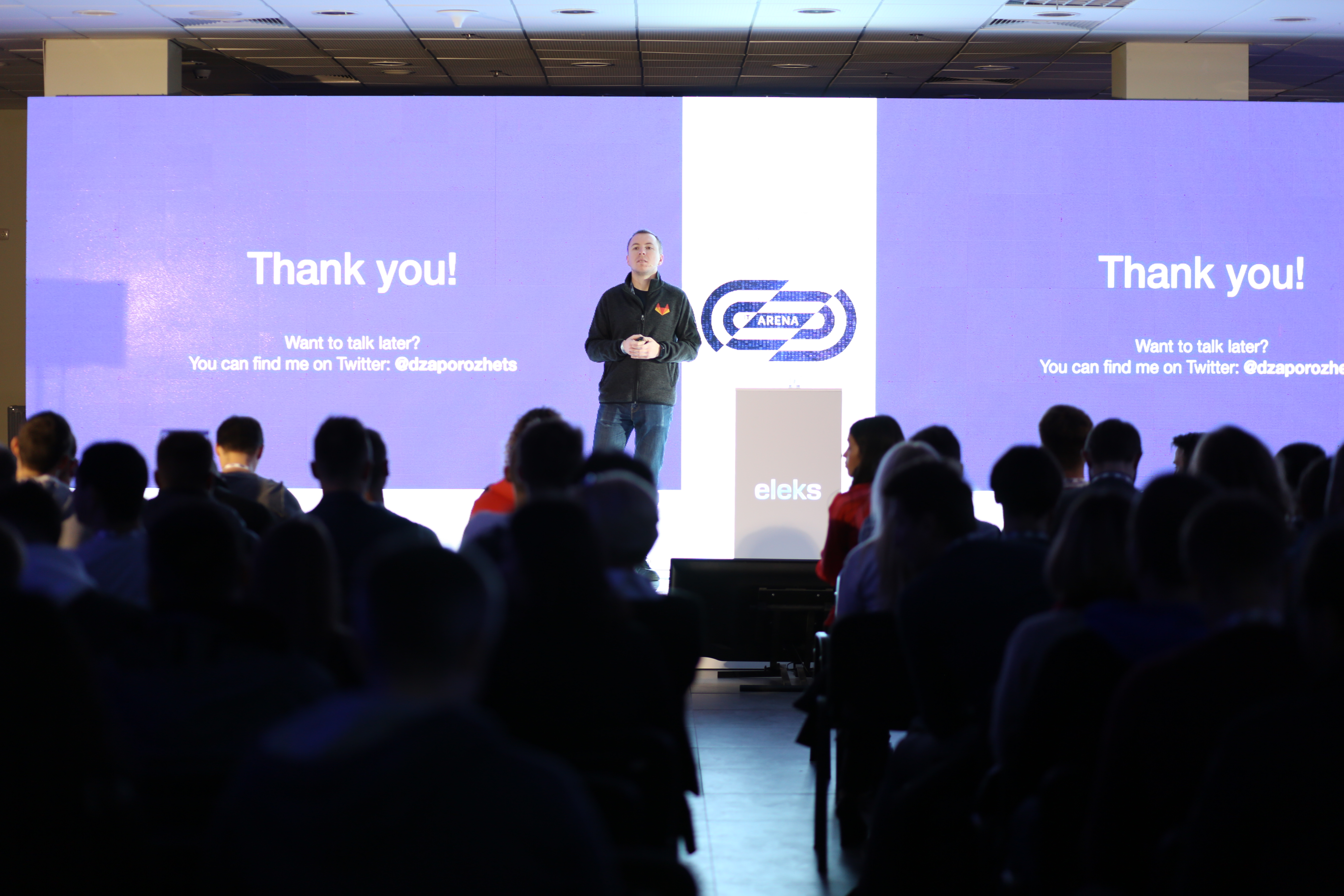While most of Ukraine’s successful tech entrepreneurs long ago relocated to the European Union or the United States, Dmitriy Zaporozhets, the founder of GitLab, a startup now worth $1 billion, is determined to stay put.
Zaporozhets lives and works in his native Kharkiv, the city of 1 million people located 400 kilometers east of Kyiv. Living in his hometown means his living expenses — and the salary his company pays him — are sometimes even less than those of his employees who live and work abroad.
“I’ve got a house, friends in Kharkiv. It’s cozy here and I can focus on my work, not overspending money on living,” Zaporozhets told the Kyiv Post during IT Arena, a three-day tech forum held in Lviv in western Ukraine on Sept. 27–29.
“If I moved to Silicon Valley, it would be more expensive for my company. I don’t want that.”
Modest start
The story of GitLab started back in 2011, when Zaporozhets worked as a web developer at Ukrainian IT company Sphere Software. He used to program using what is now Microsoft’s GitHub, a service to store and edit programming code, but found it inconvenient. Since there weren’t any alternatives, he decided to create one for himself. The result was GitLab.
For the next 18 months, GitLab continued to be just a hobby for the Ukrainian, but then he met Dutch-born Sytse Sijbrandij who suggested building a business out of it. They settled for a subscription model, offering more features for subscribers.
Zaporozhets and Sijbrandij became the startup’s co-founders and split their roles: the Ukrainian was in charge of the technical side of GitLab, while the Dutchman took on the business side.
Gradually, the service gained popularity among programmers and attracted attention from the corporate world — modern organizations rely on software and need a place to write, share and store code.
Today 100,000 firms use GitLab, including heavyweights like IBM, Sony, Alibaba, SpaceX; and the world’s leading science organizations, NASA and CERN.
And along with the popularity came financial success.
The company started to grow, almost every year attracting money from investors and expanding its team to 350 people.
Just two weeks ago, on Sept. 20, GitLab carried out its sixth investment round, raising $100 million. The details of the share purchases by investors have not been disclosed, but GitLab now says the company is worth over $1 billion.
Thus, the Ukrainian-born startup is now what the tech community calls a “unicorn” — a company valued at over $1 billion.
“A billion dollars! That sounds insane,” Zaporozhets said. “It is mentally difficult to get used to this sum. For so many years I’ve been working for food and salary, and now people keep telling me I’m a multimillionaire.”
Zaporozhets says his next step is to take GitLab public in 2020. As the company has taken money from investors there are now only two options to pay it back: sell to someone bigger or go public.
“Since we don’t want to lose GitLab as a brand and want to retain what we’ve created and remain independent, we ought to become a public company,” Zaporozhets said, adding that selling GitLab might ruin the brand the co-founders have carefully built.
Ukrainian unicorn?
Although Zaporozhets works from Ukraine, GitLab has no office — its 350 employees are scattered across 45 countries; they work from the comfort of their own home countries.
However, the fact that the company was co-founded and its code was initially written by a Ukrainian meant local tech players and media have been happy to dub GitLab a “Ukrainian unicorn.”
Zaporozhets, in contrast, thinks of his company as being a global one, but he understands why Ukrainians have laid claim to GitLab, as they are looking for some positive news.
“Maybe in this way we’re trying to make ourselves believe that we’ve made some progress amid this tough time for the country,” he said. “Ukrainian people often focus on the bad things around them, but at the same time, they compensate for that by overemphasizing the good things as well.”
“Let’s be honest, Ukraine doesn’t have so many positive moments, so people tend to cherish the good things. For Ukraine, GitLab is something to be proud of.”
Ukraine’s tech scene
In fact, apart from Zaporozhets, GitLab only has two other Ukrainians on staff — a developer and a marketer. The reason is that people here are “not proactive,” Zaporozhets said.
“Ukrainians for some reason don’t seem to have the drive to find a company they’d love to work for,” he said. “People apply for the jobs that are available, not the jobs they’d like to do. If more (Ukrainian) people sent us resumes, more would work for us, naturally.”
Another thing holding Ukraine’s IT sector back, according to Zaporozhets, is the low number of tech startups. Ukraine’s sluggish economy and tangled legislation are the reason for that, he thinks.
With conditions being unfavorable for new startups, Ukraine has instead become fertile ground for outsourcing companies, which currently employ about 50,000 local tech specialists.
“(Outsourcing firms) are generally not bad: they teach people, create jobs. But they mostly just resell the working time of their staff programmers to foreign clients,” Zaporozhets said.
That means programmers quickly hit a glass ceiling, he added.
“Looking for a career growth, they seek companies that create products,” he said. Since there are few of these in Ukraine, programmers go abroad to work.
GitLab succeeded in Ukraine mainly because of luck, Zaporozhets said.
“I am lucky my co-founder has a business mind. He’s why GitLab is not just a popular open source project, but also a successful company that’s now worth $1 billion,” he said.
“I might’ve been a good programmer, but without (Sijbrandij’s) understanding of how to run GitLab, I’d have failed.”
The Kyiv Post’s technology coverage is sponsored by Ciklum and NIX Solutions. The content is independent of the donors.
You can also highlight the text and press Ctrl + Enter








Comments (0)